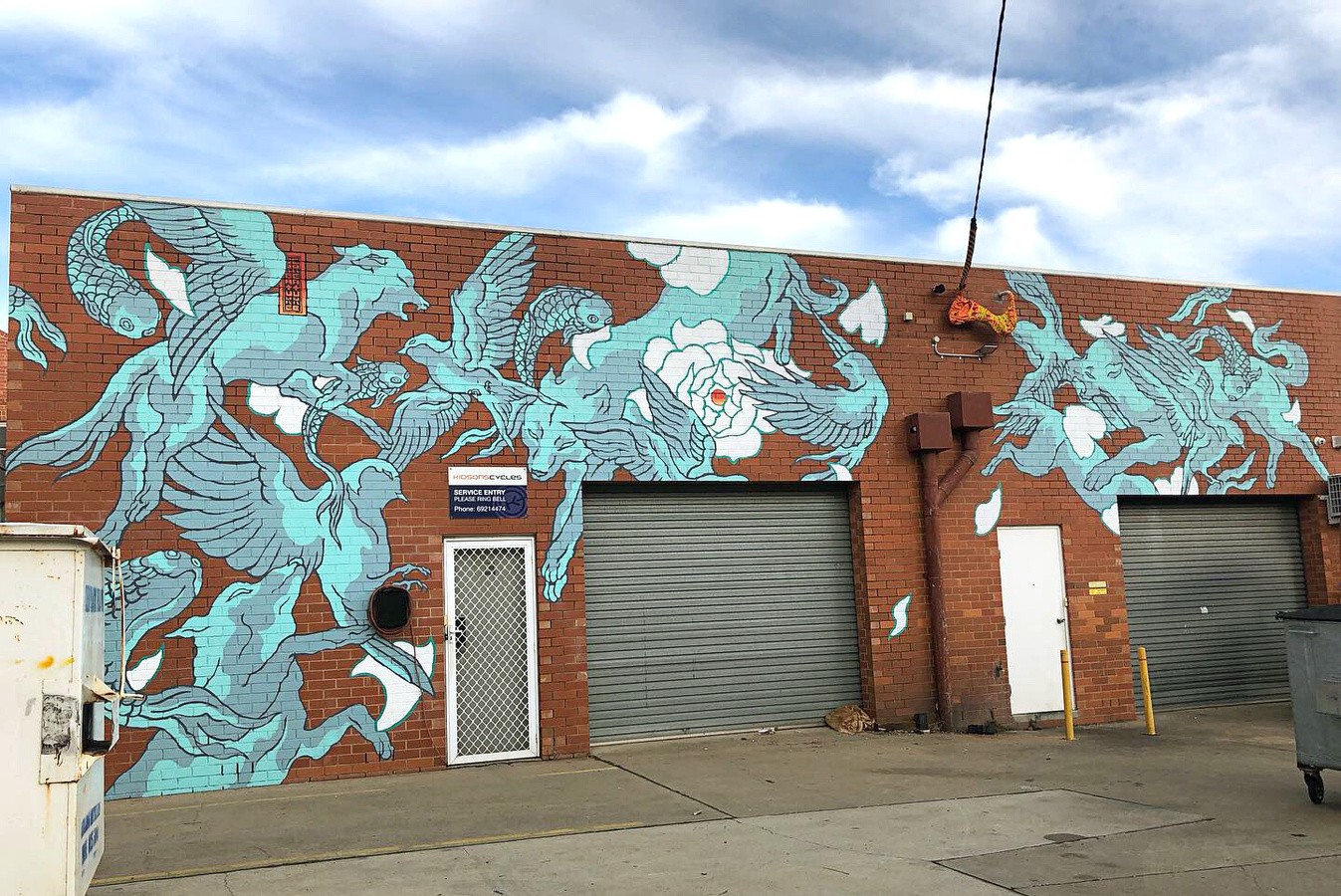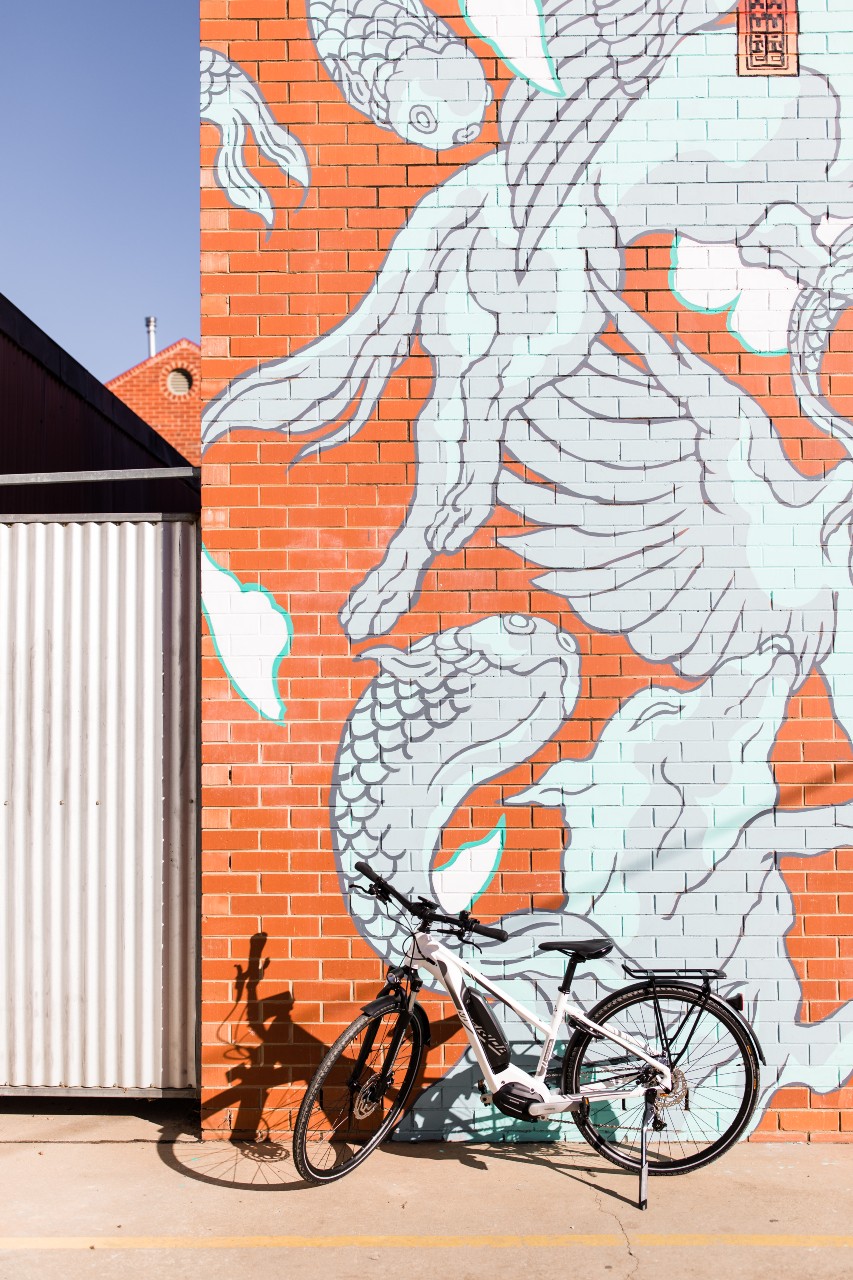Paint and aerosol
Cadell Place (rear of 105 Fitzmaurice St), Wagga Wagga
Public Art Audio Trail
Episode 2: Togetherness & Murrumbidgee Flow
Epidsode 2 combines both Togetherness and Murrumbidgee Flow.
Audio visual description - Togetherness:
Acknowledgement spoken by Bernard Higgins.
Narration, content and interview by Ashleigh Adams.
Sound and music by Sam Webber Sound.
Public Art Audio Trail - Episode 2 Transcript - Murrumbidgee Flow/Togetherness
Light, upbeat music plays.
As the walking trail takes us along the banks of the Murrumbidgee river, an outdoor gallery of vibrant murals is revealed along Cadell Place Laneway. These murals are the creative legacy of the city’s winter festivals held in 2018 and 2019 behind Wagga Wagga’s vibrant Fitzmaurice Street.
The first mural we encounter is called ‘Togetherness’, by artist duo Creature Creature. Their work represents duality and states of balance – often portraying opposing elements within their murals to convey the sum of a whole, like the yin and yang.
In ‘Togetherness’ we see birds, dogs and fish collide across the wall. The original bricks behind the mural remain untouched, letting the original building shine through and creating a balanced contrast between the turquoise paint and the red bricks. Each of these animals lives in a flock, pack or school and here they come together to represent community and prosperity.
Music fades and transitions to the sound of birds chirping, followed by the sound of flowing water. Slow, ethereal tones play through to the end of the episode.
Next is ‘Murrumbidgee Flow’, created by artist David ‘Meggs’ Hooke in 2019. This mural is instantly eye-catching with its dynamic shapes and vibrant colours. The colours of the mural transition from rich reds to deep greens and blues, representing the changing seasons. A single sweeping brushstroke carves its way through the centre of the mural, representing the flow of the Murrumbidgee River like the journey of a serpent as it travels across the landscape.
To highlight the significance of the river to the local Wiradjuri people, Meggs consulted with local Wiradjuri Elder Uncle James Ingram, and incorporated the River Redgum and the Yarran Wattle into the design. The native leaves and buds drift across the mural like they would on a warm breeze, while the footprints of a goanna plot along the river. The goanna is the totem of the Wiradjuri people, and a sign of healthy natural resources.
Meggs is going to tell us all about how this stunning mural came to be:
Narrator: How did you decide which characteristics of the landscape you would highlight in this mural?
Meggs: Essentially my work is about duality and movement. So, it’s all pretty much inspired by the flow and the energy of like natural beauty and natural elements. And so for this particular mural I wanted to celebrate the flow of the Murrumbidgee River, and so that was the core essential element and how that then moves through the landscape and creates like a visual transition between water, sky and land.
Narrator: ‘Murrumbidgee Flow’ lives on a huge space of wall behind Fitzmaurice Street, how did you divide up a wall this large in a way that will strike that important balance between positive and negative space?
Meggs: So, because the wall is such a long horizontal it actually worked perfectly in a format to emulate the flow of the river and its very much how aesthetically my work likes to look anyway. So what I then utilised is obviously darker colours down on the right end which indicate like the deeper earth, the dark sky and then that flowing through across into the lighter tones, which is sky and the transition of kind of earthy more say murkier water into sort of clearer water and then the growth and the flow of different elements across that, so that everything is kind of moving in this direction.
Narrator: Can you tell me about the significance of the native flora featured in this work?
Meggs: The main elements of native flora in the work are the Yarran Wattle and the River Red Gum Eucalypt. I chose those because they are obviously native and significant to the area but also in talking to Uncle James they’re both significant to the Wiradjuri peoples. The Yarran Wattle is used for like many different purposes. It’s seeds can be made into flour, the wood is good for like multiple purposes and what I also learnt was that there is a moth and caterpillar that lives on the wattle trees and that is a good food source for Gugaa Goannas and then obviously the River Red Gum Eucalypt is such an iconic and beautiful tree for the area of Wagga Wagga and just for I think indigenous and non-indigenous Australians alike. I know I personally really love Eucalypt as it reminds me of home and really gives me a good feeling of just being connected to the place.
Flowing water sounds fade out
Continue following the path on the levy bank to see more of Wagga Wagga’s vibrant murals.
Visual Description
Togetherness
Painted on a red brick wall, are a series of three two-toned aqua colored dogs. The dog on the left jumps in the air, circled by birds, also in two toned aqua paint. Individual feathers on the inside of their outstretched wings fan out. Also, circling the dog are three fish, also in two toned aqua. Large scales cover their bodies that taper down to a long flowing tail.
To the right is another dog, also circled by birds and fish. From underneath, the stomach of this dog blossoms a large white flower, half the size of the dog. To the right of this is the third dog, again surrounded by fish and birds. This dog has its mouth open displaying its large teeth.
Intermittently across the wall are small puffs of white cloud like shapes.
Murrumbidgee Flow
This is a long thin mural, letter box shaped, four times as wide as it is high. It’s divided vertically into two contrasting halves. The colours are bold and striking. The left background is powdery blue. The right background is completely black. The two halves are separated by a diagonal mottled, white, black and grey band, like tree bark in close up.
A bold wave line sprawls obliquely across the horizontal midline of the mural. Like four cresting waves, it evokes river bends. On the black half of the picture the line is heavy, burnt orange and red. When it reaches the middle of the picture the wave becomes gentler: mixed greens, then turquoise, teal and blues. Once the wave is on the clear blue background, at the midline of the picture it is light turquoise, then it becomes dark, then cobalt, and finally a deep dense blue black at the left picture’s edge.
A second wave line: fine, delicate and shallower, weaves a counterpoint within the river shape. In the black and red half of the mural, eight tiny white goanna footprints are dotted alongside it. In the blue half it’s become a thin brown branch, sparsely scattered with gum leaves, tiny gum nuts and a puff of pale yellow wattle blossom looking upwards against the sky blue background.
Explore the Trail
This artwork is a part of the Public Art Audio Trail, follow the link below to see all the artworks on the trail.
About the Artwork
Togetherness was installed in 2019 as part of the Lost Lanes winter festival and depicts wolves, birds and fish sprawling across the wall. These are all creatures who often spend their lives in a pack, flock or school, living and working together to received the benefits of the collective family. The artists chose to show a theme of unity and prosperity, believing the connection fostered with a community is important in survival just as these other species.
Creature Creature is an artist duo consisting of Chanel Tang and Ambrose Rehorek based in Melbourne Australia. Their work represents duality and the sum of a whole, a message of togetherness, states of balance, yin and ying. Their partnership breaks the myth of the lone artist, as collaboration is an instinctive ritual for them in realms of art, love and life.


